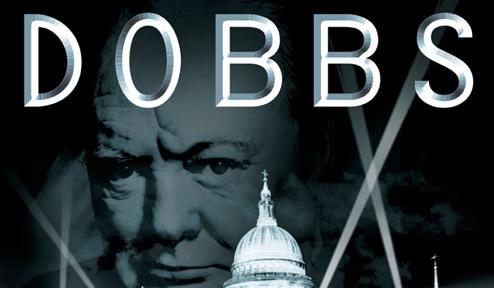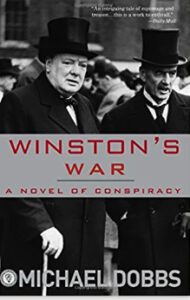
Michael Dobbs Churchill Novels
My in-laws gave me the four-book series of Winston Churchill novels by Michael Dobbs. They are set against the backdrop of the Second World War. I enjoyed them immensely. They are very satisfying reads. Dobbs offers informative, insightful, subjective views of the major players of the era. —T.D.
I certainly agree, and enthusiastically reviewed these novels when published. Years later they still resonate: Winston’s War (2002), Never Surrender (2003), Churchill’s Hour (2004) and Churchill’s Triumph (2006).
Michael Dobbs (Lord Dobbs of Wylye) is most famous as the author of House of Cards, the long-running British and American series of political skullduggery in high places. His Churchill novels are however of another genre. They are fiction with a sense of place and and character. They do not strain historical credulity. Dobbs gives us an honest picture of Churchill without slapping him with perceived foibles. (Churchill’s real foibles are plain enough in the Dobbs lexicon.) Here is an excerpt from my review of the first title in the series.
Winston’s War (2009)

In April 1938, facing a mountain of debt, Churchill put Chartwell, his beloved country home, on the market. A few days later he withdrew it. Brendan Bracken, his political disciple, had saved the place with a canny intervention. Bracken convinced the financier Sir Henry Strakosch to manage Churchill’s investments, being responsible for all debts and losses. Strakosch thus spared Churchill financial distractions during his campaign for British resistance to Adolf Hitler.
For purposes of this novel you are required to believe that the Strakosch rescue never occurred—that Churchill’s finances were still precarious when Neville Chamberlain went to Munich in September 1938; and that Churchill was incensed by Munich because his investments, made in anticipation of war, might not now pay off.
You must also believe that two civil servants, Sir Horace Wilson and Sir Joseph Ball, were, respectively, Chamberlain’s eminence grise and political assassin. The first dictated the PM’s every move between Munich and the invasion of Poland. The latter went after Chamberlain’s enemies with the tactics of a Mafia chieftain. This is not too radical a description of Wilson, but the real Ball was a milder character.
What war was…
If you are willing however temporarily to believe all that—and if you will further accept that Chamberlain hated Churchill till the day he died (he didn’t)—Michael Dobbs will spin you a good yarn about the parliamentary machinations, treachery and betrayal by which Churchill became Prime Minister in 1940.
He will also tell you, better perhaps than any history book, what the war was like for ordinary people, trying to preserve their families amidst the chaos brought by incompetent leadership.
These little stories, intertwined with the main plot, tell a story endlessly repeated in Britain, whose citizens knew better than anyone the sheer horror of the Second World War.
True to life
Many of the character sketches—Alfred Duff Cooper, Samuel Hoare, Lord Halifax, the King—are powerfully believable. Two fictitious Chamberlainite MPs are quoted throughout—I was convinced I was hearing Walter Runciman and Rab Butler. The omnipresent shade of Lord Randolph Churchill remains in Winston’s mind, Lord Dobbs wrote me: “I have always compared and contrasted Churchill’s relationship with his father to that of—wait for it—Adolf Hitler. Hitler loathed his father. I suspect that relationship might have been a cause of the son’s brutal and depersonalized character. Churchill, by contrast, embraced his father’s neglect and gained character, strength and compassion from it. A huge plus for Winston.”
Dobbs novels are well crafted. I couldn’t put Winston’s War down. A gripping tale, told with the famous skill that gave us Francis Urquhart MP, the evil schemer of House of Cards—what more could you want?
Dobbs on Dobbs
Here are in the views of Lord Dobbs himself on the role of the novelist:
A novelist’s eye looks to the inner man: not simply what he achieves but who he is, how true and how strong his heart beats. In my eye, Winston Churchill had one of the most extraordinary hearts of all time. It beat as resolutely as a drum, and to its timbre the world marched from the jaws of Hell. Yet that same huge heart also overcame obstacles in his private affairs that would have crippled most ordinary mortals. He was great not because he got everything right (hah!) or because he was always pleasant and polite (he wasn’t), but because he managed to save our world even while battling with his own private demons.
Is he relevant in today’s world? Of course he is. Open your newspaper and you will be bombarded with messages about a World Crisis, a Gathering Storm, nations torn between the appeals of meeting jaw to jaw as an alternate to war. Some of the issues have changed, of course. But the fundamental inspiration of Churchill’s life was that we make our own world. The tide of history isn’t driven by irresistible Marxist-Fascist tides and irreversible social trends but by the passions of men and women. What we do, you and I, and those we elect, makes a difference. In the end, it’s up to us, and how big we find our hearts to be.
Identifying with the Old Man…
Yet it’s the nature of the man that appeals to me most. When I talk to school children about that strange beast Winston Churchill, I show him not just as an overly-round sixty-something with little hair and a fat cigar who did extraordinary things, but also as a tormented and at times frightened child who was subjected to abuse at school and—let’s be frank—a fair dose of parental neglect at home. Yet still he made it through. If Winston were in a classroom today he would be sitting in the back row, a child with few friends, with a troubled home life, with learning difficulties, with school reports that summed him up as all but worthless, who couldn’t even make it to university. And yet….
To watch the fascination of young eyes suddenly alert, identifying with our Old Man, realising that perhaps they, too, might find some way to overcome their own personal challenges, never fails to be a transcending moment.
What would his message be today? I suspect it would not be framed in terms of Mission Accomplished, but neither would it be Mission Impossible. Wherever he is remembered, the memory brings hope and a reminder that nothing in the course of human affairs is beyond our reach. He remains an inspiration to schoolchildren and statesmen, and to the rest of us who fall somewhere in between.







2 thoughts on “Michael Dobbs Churchill Novels”
I agree that Dobbs’ Churchill novels are entertaining, accurate, and give a good feeling of who Churchill was as a man. I take exception with one disturbing aspect. In Winston’s War Dobbs used, of all people, Guy Burgess to prop up a less than resolved Churchill to deal with the Hitler threat. In the second novel in the tetralogy, Never Surrender, Dobbs used Ruth Mueller, a refugee from Germany, to stiffen Churchill against the Hitler menace. Sci-fi novelist James Hogan (The Proteus Operation, 1985) sent a team of Americans from 1975 back to 1939 similarly to prop up Churchill to fight Hitler. Everyone should know that Churchill needed no one to stiffen his resolve. The assertion that Churchill was needed someone else to motivate him is fallacious and downright offensive. Nevertheless, the novels are worth reading and give keen insights of the back-of-the-room politics that Churchill had to navigate.
Langvorts, Great stuff. Keep it coming and I will remain and interested and avid reader. Dieus Sveti Latviu. With fond memories of earlier years and all best wishes for future years. Russells.
–
Paldies, Raselam, un ar laba vēlējumiem Jaunajam gadam un Latvijas neatkarības 51. gadam. -Langvorts
Comments are closed.